
Lessons from the Farm
by Joni Kamiya, Hawaii Farmers Daughter, October 15, 2016
My kids are on fall break so this is one of the few times they get to go down to Grandma and Papa’s house. Some of the time it’s playing and the other time is spent working on the farm. To my older daughter, it’s not the best way to spend her time but she realizes that she can make a little bit of money so it’s not so bad. For my younger daughter, her first words are, “Do I have to?”
When you’re 6 years old, it’s way more fun to be playing outside or on the IPad. To spend hours on your feet and putting stickers on thousands of papayas, it’s not fun. Heck, I remember as a kid how much I disliked the farm work day in and day out.
As my dad was overhearing me talk to my daughter about staying on task and helping out on the farm, he started to laugh and said, “Those words sound familiar, huh?” I thought to myself that what she is saying is exactly what me and my siblings used to whine about. As much as I didn’t like working as a kid, it sure taught me a whole lot of lessons on how each of us are parts of the working machine and when one part isn’t working, the whole machine can’t function well. It’s the same for a farm.
To make the work more fun for my daughter, I decided to make a little competition with her on who could sticker the fastest on their half of the case. If it was a tie, then we’d have to play jon-ken-po (rock-paper-scissors Japanese style) and we’d get a winner. This worked like a charm with her and she managed to stay on task for the entire 6 hours we all spent preparing some 5000 lbs of papaya. She realized that she was an important part of the farm too that day.
As I’m teaching my children what it’s like to be part of a farm family, I’ve realized that everyone who works on a farm learns some lessons that very people ever get in life. Here’s some of the lessons I’ve learned on the farm:
- You can’t always do what you want on a farm and you have to develop skill to do certain tasks.
- If you stop and commiserate about how awful your work is, you hold up the entire operation.
- You’ve got to be productive with your time because there’s always something more to do even if you’re tired as heck.
- You’re not always going to stay clean and sweat free working on a farm.
- There’s always bugs and other pests around that you can either freak out about or get over it.
- People are dependent on the work you do and want the best.
A farm relies on the community to survive and thrive. From our customers down to our workers, everyone plays a vital part in it’s success. If we don’t grow good food, our customers won’t support us so we’ve got to maintain a quality product and have it for them regularly. If we don’t have the manpower, we can’t get any of the work done to get our fruit out or cared for either. A farm is really about people power and having the community be it’s foundation.
What’s the biggest problem with continuing in the path we are taking in Hawaii? With no support of our current farms and farmers, we lose the next generation of farmers and that is the worst consequence we will face. No new generation wanting to take on family farms means a smaller percentage of people willing to grow food and grow Hawaii. Farming families need the support of the community because their failure means a loss to everyone.
Our keiki are spending so much time focused on getting good rest scores and doing well academically, but are learning some real life lessons. The younger generation is afraid of hard work and perseverance. When things look to daunting, they can’t pull through. Who will stay farming if the concept of hard work isn’t a value that’s taught. A farm requires dedication, perseverance, a lot of toughness, a love for learning, and tenacity to get through tough times.
The only way we can grow Hawaii is to grow our people and grow leaders grounded in facts to have a clear idea of what we want for the future. It’s about time that we go back to our communities and start cultivating relationships again because our future depends on it. We have to get kids on the farm and keep the ones who are on there learning those important lessons if we are to grow Hawaii.
---30---